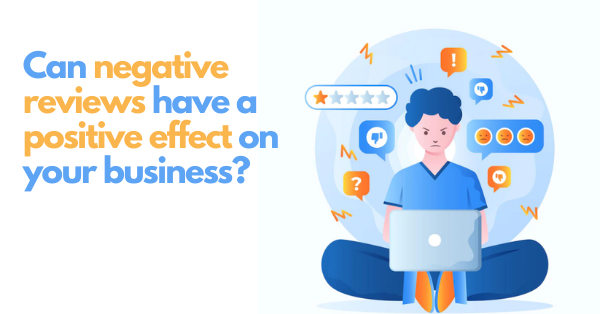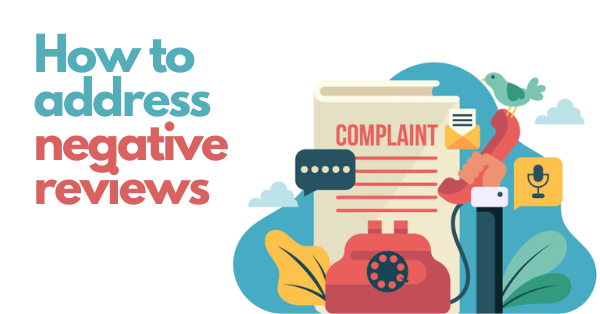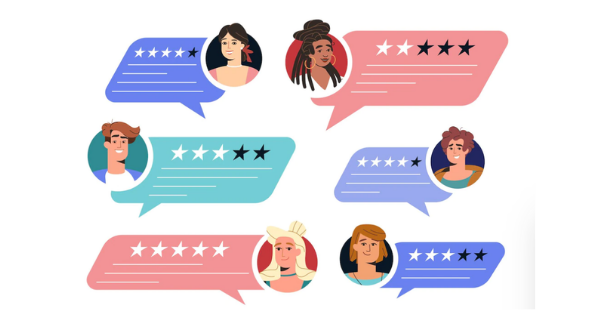Let’s face it - getting negative reviews is far from pleasant, but it’s inevitable. No matter how hard you try, it’s just simply impossible to satisfy all the clients.

So, the bad news is that customers complain, and they usually do it in a public manner. But, the good news is that there is a way of turning negative feedback into your advantage.
Keep reading to learn more about:
- What are the most common issues customers complain about
- What they expect as a result
- How you should address negative reviews
- How negative reviews can benefit your business
- What can help you improve your online reputation management
There are lots of things to discuss, so let’s not waste time.
Why do customers write negative reviews?
You simply can’t please everyone. That’s a hard pill to swallow, but the sooner you accept it, the more relaxed you’ll feel.
While some reasons for negative feedback might seem unfounded to you, there can be many objective reasons behind customer dissatisfaction.
Customer complaints can be grouped into three categories:
- Service issues
- Product issues
- Policy issues
According to research done by Corra, 52% complain about bad customer service, 31.4% complain about product issues, and 16.6% complain about the policies they disagree with.
What do customers expect to see as a result?
When sharing negative reviews, customers would like to see a certain outcome. Some of the most often ones are the following:
- They want to hear an apology
Offering an apology should be a mandatory part of every response to a negative review. Before proceeding with solving the issue, you must take care of the upset customer.
- They want to prevent other customers from having a bad experience
Customers know that other future prospects base their purchasing decision on online reviews. So, if they made a bad decision, they would like to avoid the same thing happening to others.
- Customers look for more honesty from your side
This issue is mostly connected to the company’s policies. Customers would like you to be more honest and upfront about your actions. Make sure to avoid having any hidden costs, or any other non-transparent points.
- Getting a financial reimbursement can be an important motive
It’s not usual that customers who leave negative reviews are looking for a money refund. Of course, not every customer can get a refund, but in some cases, this could be an appropriate solution. However, every situation and business can be different, so you’ll have to assess each case individually.
- Some customers just want revenge
Well, this is not pleasant to hear. But, unfortunately, it’s true. Customers that just want revenge are the ones who just want to hurt your online reputation. Truth be told, there’s not much that you can do to improve their impression because they’re not looking for it. What you can do is respond politely to these reviews and ask what can you do to solve the unpleasant situation. Their answer will probably trail, but it will shove other customers that you have shown goodwill to resolve the situation.
How you should address negative reviews
We have already discussed why responding to online reviews is important for your business. But, responding to negative reviews is especially important.
Besides addressing the particular issue, by answering negative reviews you’re showing future customers that you value all feedback equally.

There are a couple of easy steps that you can take when responding to negative reviews:
- Respond quickly
- Start with an apology
- Take responsibility
- Show empathy and will to understand and solve the issue
- Provide an explanation
- Offer other ways of communicating - email, or a phone call to get a better understanding
- Take necessary actions to solve the problem
How negative reviews can benefit your business
This might sound counterintuitive, but it’s true - you can benefit from negative reviews. Getting an occasional semi-negative review doesn’t mean that your business is going under the bus. Moreover, they can provide you with useful insights.
- Building trust
The first thing that negative reviews can help you with is building trust. Research done by Eldeman shows that almost 81% of customers want to feel trust before making a purchase. And there is no better way of earning trust than to be transparent. When talking about reviews, that means being transparent about the negative ones. Don’t delete or neglect them. Approach them as any other feedback and your future customers will see that you’re real, and not some spotless and fake brand.
Believe it or not, negative reviews can actually help you with adding more credibility to your brand. Whenever there is a brand with only positive reviews, customers suspect that those reviews are fake - bought or censored. If you think about it, it makes sense - not everyone can be completely satisfied with your product or service, so it's logical for customers to think that there must be something shady.
- Increasing sales
When looking to buy a product, customers rely on other reviews and star ratings. But, contrary to popular belief, 5-star reviews don’t always mean higher sales.
Why? Because customers find it fake. When there isn’t a single negative review, future customers think it’s some kind of a scam. Thus, having a mixture of positive and negative reviews is what gives your business credibility. Baymard research shows that around 53% of potential buyers are on the hunt for negative reviews since they find them more important before making a purchase. Further, this number increases up to a shocking 91% among the population between the ages of 18 and 29!
Another influential factor besides reviews is rating stars. Research from Northwestern University showed that purchase probability peaks when you have a star rating between 4.2 and 4.5. If the average score goes above 4.5, the sales probability actually drops. Why is that the case? Shouldn't the best possible service be the end goal of every business? So, how come businesses with a star rating of around 4.5 show better results?
Choosing a product with an average 4.5 rating doesn't mean that a customer is willing to pay for something that is slightly worse than absolute perfection. It indicates that they've gone through an analytical process of comparing different reviews, both positive and negative and that they made an informed decision. So, 4.2 and 4.7 is the golden middle - the reviews are still overwhelmingly positive, but the existence of negative ones improves brand credibility and trust.
- Helping other customers make a better decision
You might ask what can be good about the fact that someone decides for your competitor instead of you. But, the story is not so simple.
It’s a misconception that customers always know what are they looking for. Sometimes they need to buy a product only to understand later on that that’s not what they’ve been looking for. After they understand why your product is not the best fit for them, they might leave a negative, or semi-negative review. However, there’s no need to be afraid of those reviews.

They will serve as a sort of guidelines for other customers to understand whether to make you their first choice or not. You might not see it right away, but the truth is that you don’t want to attract customers that are not the best fit for your product. That doesn’t mean that there’s anything wrong with your product or service, it’s just that you’re not what they’re looking for. Therefore, such customers can serve as a “filter” for future prospects.
- Knowing what are the fixable issues
When creating your product, you get so invested in the process, that it often happens to overlook some very basic, yet important points.
Among customers who leave negative reviews, there are always some of them that stress those things out. Such reviews help you identify issues that have gone unnoticed. Thus, think of negative reviews as a great feedback mechanism.
What can help you improve your online reputation management
As you already know, online reputation management is made out of both negative and positive reviews.
While no one worries about positive reviews, negative reviews require more attention.
But, there’s one big problem. How to find, monitor, answer, and analyze all those reviews?
Besides sharing reviews on your social media, customers can share their experiences on other places such as retailer websites, third-party websites, or review sites. There’s no way you can track all of that.
Worry no more! There are online review aggregators who are here to help you! These online tools are meant to scrape even the most complex websites and gather all the reviews. They can also help you answer them, and improve your overall online reputation.
The bottom line
No business can avoid negative reviews. But what sets good businesses apart from the less successful ones is the way they address those reviews. Even though there is no one-size-fits-them-all answer, you should always aim to embrace those reviews, instead of brushing them under the rug.
Rather than being fearful, start taking the good thinking out of bad reviews. We hope that we showed you a couple of them. 🙂
How are you dealing with negative reviews? We would love you to share your experience with our readers in the comments below.
